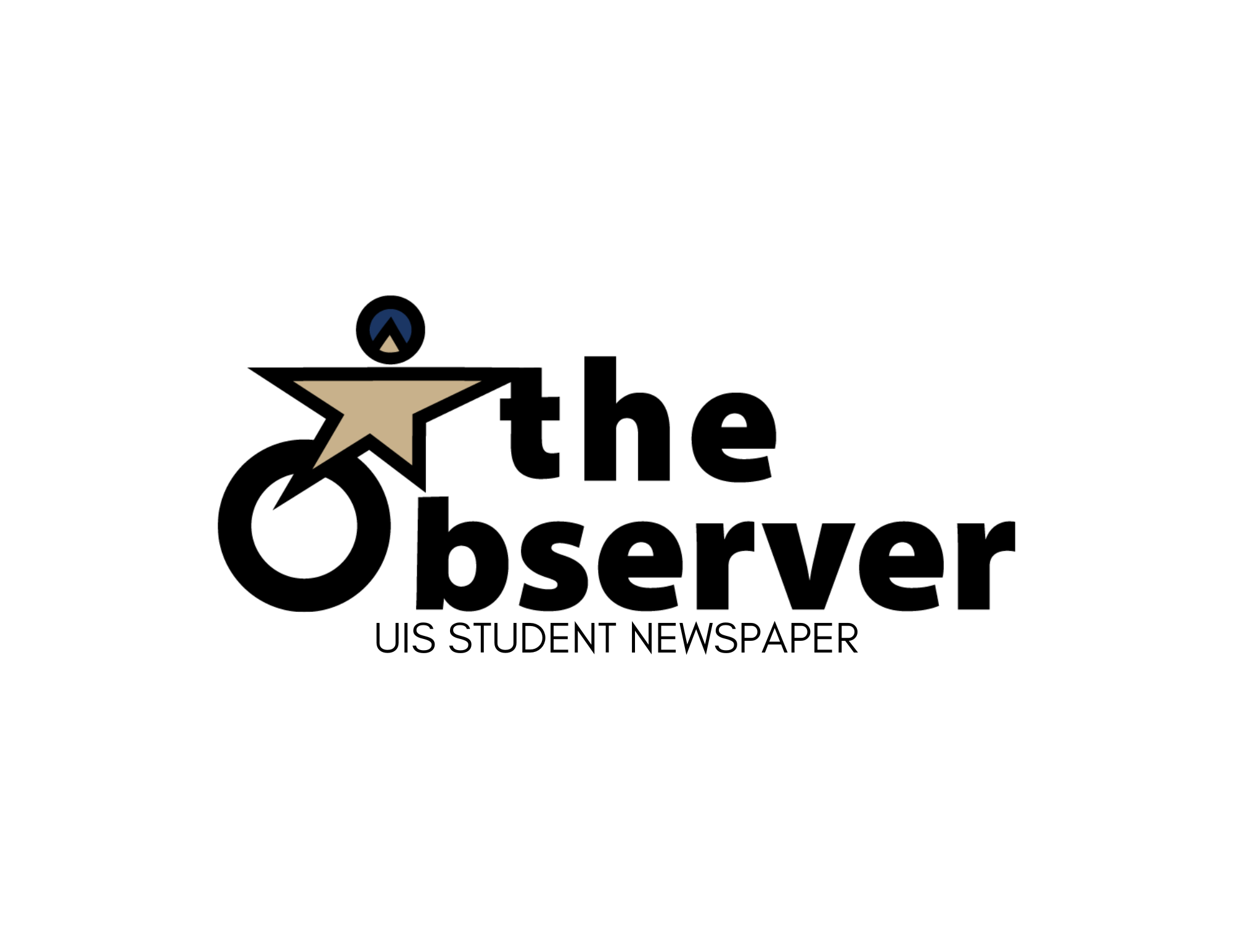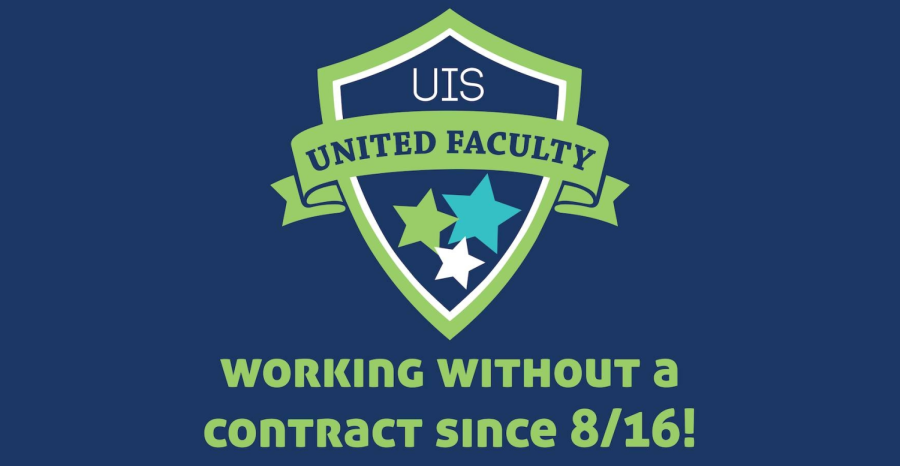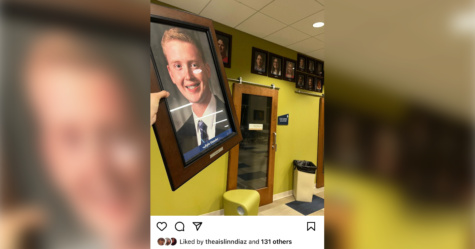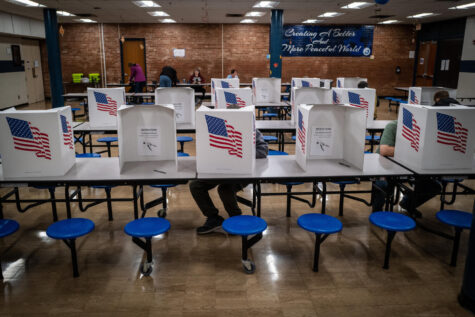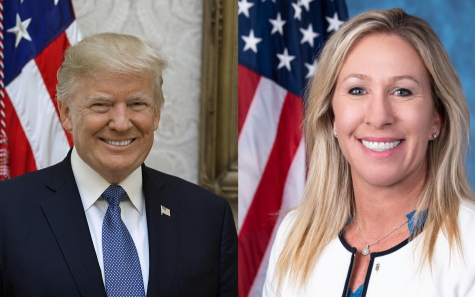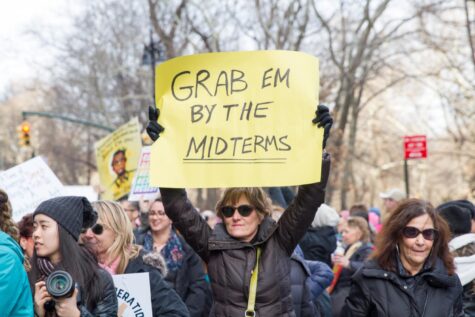UIS Faculty Union Negotiations: What Do They Mean for the Future?
As we sit here today, the UIS Administration is at an impasse with the UIS Faculty Union, UIS United Faculty (UIS UF), regarding their ongoing contract negotiations. Members of UIS UF have been working without a contract since Aug. 16, 2021, with no clear end in sight. Despite the fact that negotiations have been officially ongoing since Feb. 1, 2021, the university system has yet to find a resolution. Now, as UIS UF works without contracts, we find ourselves, as students, in a tenuous situation that could affect the educational experience for us all, with little concern shown from the UIS Administration regarding such an experience.
Throughout November and December of 2020, UIS UF had engaged in several meetings with Labor Relations. In these meetings, UIS UF requested the university to consider a one-year extension of their now lapsed, contract agreement. The grounds of the faculty union’s request were due to the university’s mass overhaul and reorganization of internal colleges and academic departments. In addition to the ongoing reorganization, the current state of the COVID-19 pandemic had also created difficulty among faculty and students alike.
In December of 2020 and January of 2021, UIS UF members and UIS administrators met with a Federal Mediation and Conciliation Service (FMCS) mediator, to conciliate ways to work in a positive and collaborative manner towards a new contract agreement, with UIS UF members electing to engage in intentional bargaining. These conversations resulted in the UIS administration issuing a Demand to Bargain with UIS UF on Feb. 1, 2021, later resulting in 11 bargaining sessions that have yet to develop a conclusive agreement. The first bargaining session was on March 8, 2021. For those who may not know, a Demand to Bargain is a procedure that can be taken by either a union or management to initiate a series of events that allow for either party to renegotiate terms covered by the contractual agreements between them. Notes from the various bargaining sessions, and the lapsed contract agreement, can be found here on the UIS UF website.
On midnight of Aug. 15, 2021, a week before the start of the fall semester, the UIS UF contract with the university expired. The consequence of this expiration means that current tenured and tenure track faculty will not receive their annual salary increase as contractually promised in Article 7, Section 1. Furthermore, many faculty members who have been promoted to associate or full professor will not receive their salary increase for change in employment level as contractually promised in Article 7, Section 2. Nevertheless, such faculty members are expected to complete all required teaching and non-teaching responsibilities, despite the increased time commitment for each responsibility.
However, in spite of the precarious situation UIS UF members find themselves in, all administrators still received a 2% salary increase this year. According to Derek Schnapp, the official spokesperson for UIS, regarding our question about the veracity of these claims, “President Killeen authorized all three universities to implement a 2% merit program for the 21/22 school year. Increases for employees represented by a union are subject to salary negotiations and/or the existing collective bargaining agreement and cannot be implemented by the university unilaterally”. As we see above, according to the lapsed contract in Section XX, “Notwithstanding any provisions of this Article or Agreement to the contrary, this Agreement shall remain in full force and effect after the expiration date and until a new agreement is reached”. Ultimately, these faculty members should have received a 2% salary increase but have yet to receive it.

UIS UF began their organizing push in 2013, resulting in the certification of their union in 2015. UIS UF was formed in response to growing concerns among faculty about nefarious tactics being used by the UIS administration in hiring and retention decisions. Specifically, after two tenure track faculty members, who were supported for tenure by multiple faculty committees, had their decisions overturned by administrators. Additionally, there are concerns regarding UIS administrative spending decisions and the favoring of administrative projects over properly sourcing academic programs along with many years of either minuscule or zero wage increases for faculty members. Following certification in 2015, UIS UF engaged in a two-year negotiation with the university system for a contract agreement. In May 2017, after 20 months of negotiations with dismal results, UIS UF members went on strike. Following the four-day strike, UIS UF and UIS Administration reached an agreement. This agreement included several important and critical protections:
- Appeals process for denials of tenure or reappointment on the basis of procedural violations.
- Establishment of a grievance process that could offer protections for faculty who were fearful of administrative retribution.
- Salary minimums, starting at $55,000/year for first year faculty members.
- Minimum salary increases of 1 percent annually or campus wage (whichever was higher) for the life of the contract.
Since that time, UIS UF has pushed the university to reinstate its “desktop refresh” program. This was a program that ensured faculty had replacement computers every four to five years. In September of 2019, the university killed the program, which you can read more about here from NPR. We spoke with Dr. Kristi Barnwell, UIS UF Chapter President, about the importance of faculty unions. “Faculty Unions do more than ensure faculty get fair raises,” she said. “They work to make sure [the] faculty voice is protected and that when faculty speak up about matters important to the university and our students that we aren’t ignored. Administrators often talk about students as sources of tuition dollars and productivity units for their business models. That’s not what faculty are here for. We are here to help create lifelong learners who are prepared for a 21st century world.” The current faculty negotiations are centered around the following issues:
- A safer work environment with postings and contact information for construction projects that interrupt class or that might be unsafe.
- Meaningful leave and workload protections for faculty who are experiencing serious health crises or who have new children.
- Clear plans and alternatives for cancelling classes.
- A living wage and fair compensation for their work.
In a recent Campus Senate meeting, Interim Chancellor Karen Whitney suggested that future faculty and staff salary raises should be tied to the enrollment census and specific enrollment goals as designated by the university. Additionally, it was suggested that it is the faculty’s responsibility to increase enrollment, according to Provost Dennis Papini, in the meeting notes from Sept. 10, 2021. According to Mr. Schnapp, “Campus Senate meetings are usually recorded.” However, we could not find them on the UIS website or through extensive keyword searches on search engines. When asked about the veracity of our claims, Mr. Schnapp did not deny that the interim chancellor stated this. This suggestion is potentially troubling because faculty has no control over the various activities involved in enrollment, including but not limited to recruitment, admissions, and enrollment of new students.
Moreover, faculty members are being pushed out of the conversation and decision-making process. This can be evidently seen in the Campus Senate, where the faculty decisions about the current curriculum and different degree programs at the university are made. The result of this system puts the members of UIS UF in a powerless and impossible position, where they must decide whether it is more important to make a living wage and have a safe workplace or be able to shape the young minds here at UIS.
When we asked the University Spokesperson about the current impasse, Mr. Schnapp told us “the parties are not at impasse. The parties continue to negotiate in good faith and have additional bargaining sessions scheduled for the fall semester.” In response to our request for comment about the ongoing negotiations, Mr. Schnapp stated, “You may have heard that the Faculty Union and the University are switching to a more traditional style of bargaining. We hope that both parties continue to approach the negotiations in a thoughtful and collegial manner and have productive discussions on the remaining issues. In an effort to help keep the negotiations moving forward, the University has offered to make time to meet on a weekly basis and/or all-day sessions whether during the week or on the weekends.”
The Student Perspective
Given the potentially worrisome nature the effects of this situation could have on students and our education here at UIS, we felt it was important to ask some students what they thought about the steps the administration is taking toward these negotiations and what that could mean for the future of our education, as students, here at UIS.
“Without professors, there would just be a campus here. No one would be learning, how can you go to college without teachers?” UIS sophomore Tyla Brown said, emphasizing the impact faculty members make on a college campus. When prompted with individual input surrounding the current faculty negotiations, fellow UIS students’ beliefs rarely varied. Such student opinion was blatant and undisputed: pay faculty members salaries worthy of their hard work and accomplishments.
In utter dismay at the obscure tangles in the negotiation, few students understand the grounds of faculty member’s salaries simultaneously intertwining with the dwindling student enrollment. Expressing a rather common sentiment, UIS junior Vanessa Reed expressed her perplexity regarding the unspecified connection. “I don’t really understand why [faculty salaries and student enrollment] should be connected. I understand if you don’t have enough students then some professors can’t teach a full class,” Vanessa continued. “I think faculty members should still get the money they want and deserve — regardless if there are enough students – because they still have a job to do.”
Vanessa is not alone in this sentiment as Tyla Brown conveys aligning opinions. Despite the declining enrollment at UIS, Tyla supports and encourages the idea of the university paying faculty members higher, more competitive salaries. She went on to vouch for her professors on campus, stating, “…a lot of my teachers have a Ph.D., so if they’re not making enough after going through years of [education], they should be making what they are qualified for.” Tyla finalized this thought, mentioning that with the proper qualifications, quality faculty members “shouldn’t be making less money.”
An unnerving sense of uncertainty was apparent when asked if quality faculty members would be attracted to UIS if salaries were to be instilled upon student enrollment. Terms like “50-50” and “yes and no” were a common theme when asked this specific question. Whether a resonant statement in and of itself, Mikaela Aguirre, a senior at UIS, justifies her indecision with such a policy. “If we had thousands of students, like Urbana or UIC, then there would probably be faculty that would be interested…” Mikaela stated, insinuating a pique in salary interest as enrollment rates prove to be higher at campuses with larger enrollments. Which leaves UIS in a precarious place, being a smaller university.
Vanessa Reed asserted her opinions along the same lines, stating, “I think some people will be like, ‘This could be a good opportunity.’” She continued, “some people might feel like it’s a waste of time to pay them [more] when there’s not a lot of students, but then some people might be like, ‘You know what, I still work hard. I still come and do my work. I wake up every day and I still do the same thing, I need more money because now I have to work even harder.’”
One might pose the question: What are student’s opinions on a baseline solution to this negotiation, if any? While admitting a formal working group may be productive in some ways, additional avenues of exploration were suggested. A general consensus of directly voicing concern to Interim Chancellor Whitney would resolve the matter and, possibly, wield a promising outcome. Mikaela further suggested incorporating a petition of sorts, stating, “I feel like petitions are a good way of showing how big the issue is and how many people are trying to solve the issue.”
Review of UIS UF Internal Data
The UIS UF did some internal data collection on UIS UF members across the following areas: Faculty Feelings of Connection to UIS, Do Faculty Feel “Valued” by UIS Administration, Job Performance of Key Campus Leaders, and Comparing Performance of Deans Across UIS Colleges. The Journal has obtained copies of the data collection and the results are very concerning for the future of UIS.
We will review each area examined from the 72 UIS UF respondents (n = 72) that took part. It is important to note, according to the UIS UF internal documents, “the response rate for this survey exceeds the 30-40% threshold that is widely accepted as the standard for internal surveys of this type.” Additionally, regarding “two background questions – ‘tenure status’ and ‘college.’”, according to the UIS UF internal documents, “results for the background items indicate that 36% of the survey’s respondents were untenured faculty, with a college breakdown as follows: CPAA: 25%; CBM:10%; EHS: 10%; CLAS: 55%”.
Now let’s take a moment to review each of the four areas examined in this internal survey:
Area 1: Faculty Feelings of Connection to UIS
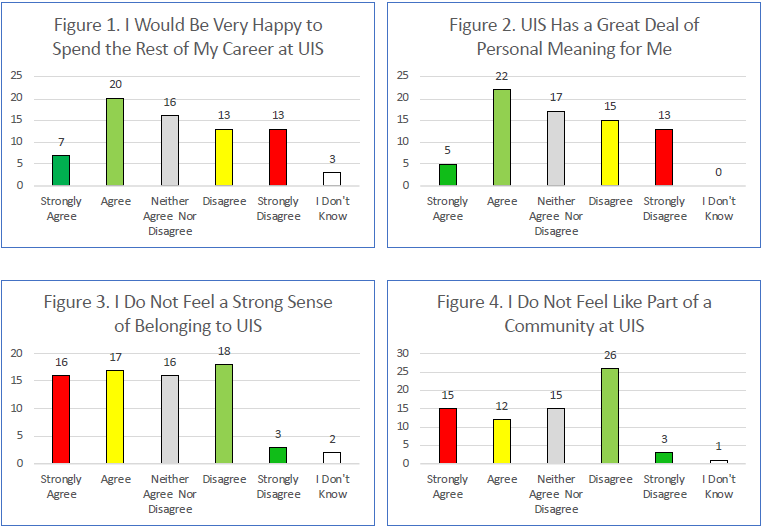
What is evident in these numbers is that many UIS UF members do not feel a great connection to UIS. In Figure 1, we can see that only 27 of the 72 respondents responded with a positive answer (Strongly Agree or Agree) regarding if they would be happy to spend the rest of their career here at UIS. In Figure 2, we can see only 27 of 72 respondents responded with a positive answer (Strongly Agree or Agree) regarding if UIS has a great deal of personal meaning to them. In Figure 3, we can see only 21 of 72 respondents responded with a positive answer (Disagree or Strongly Disagree) in relation to NOT feeling a strong sense of belonging to UIS. Finally, in Figure 4, we can see 29 of 72 respondents responded with a positive answer (Disagree or Strongly Disagree) regarding if they do NOT feel like part of the community at UIS.
These results signal a warning that a majority of UIS UF members do not feel connection to UIS, which has a grave meaning for the outlook of faculty retention and, furthermore, the experience of students and the quality of our education.
Area 2: Do Faculty Feel “Valued” by UIS Administration
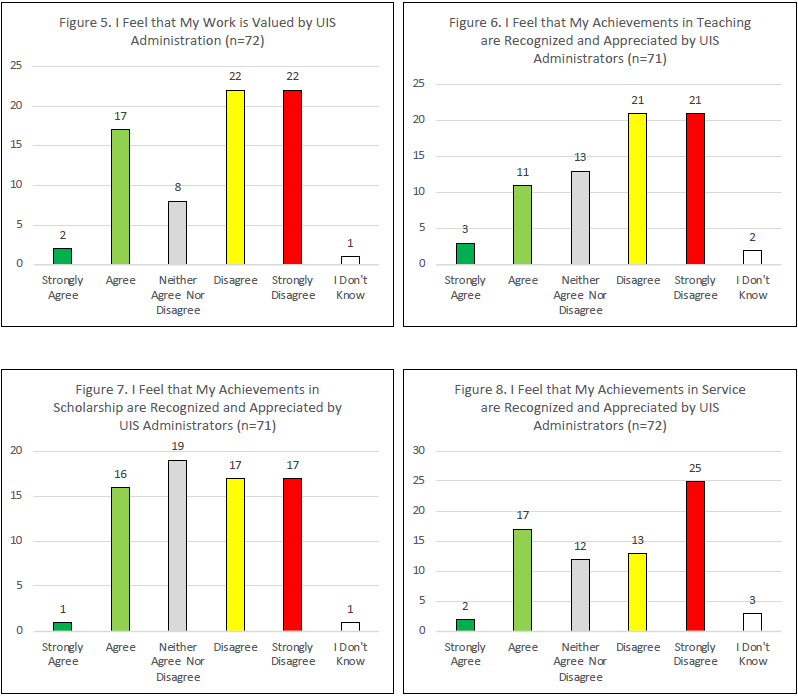
In the figures above, we see the continuation of the staggering trend in the results of whether faculty feel valued by UIS administration. In Figure 5, we can see that 19 of the 72 respondents responded positively (Strongly Agree or Agree) regarding whether they felt their work is valued by UIS administration. In Figure 6, 14 of the 71 respondents responded positively (Strongly Agree or Agree) about whether they feel their achievements in teaching are recognized and appreciated by UIS administration. In Figure 7, 17 of the 71 respondents responded positively (Strongly Agree or Agree) in regard to whether or not they feel their achievements in scholarship are recognized and appreciated by UIS administration. Lastly, in Figure 8, 19 out of the 72 respondents responded positively (Strongly Agree or Agree) in regard to whether or not they feel that their achievements in service are recognized and appreciate by UIS administration.
Again, like the first examined area, these results are concerning. A majority of UIS UF members feel they are not valued by UIS administration across a variety of dimensions. Now, couple these results with the results of Area 1 and the effects on faculty retention look exponentially dismal. Which, again, will have a grave effect on the educational experience here at UIS. One that we the students pay for, both figuratively and literally.
Area 3: Job Performance of Key Campus Leaders
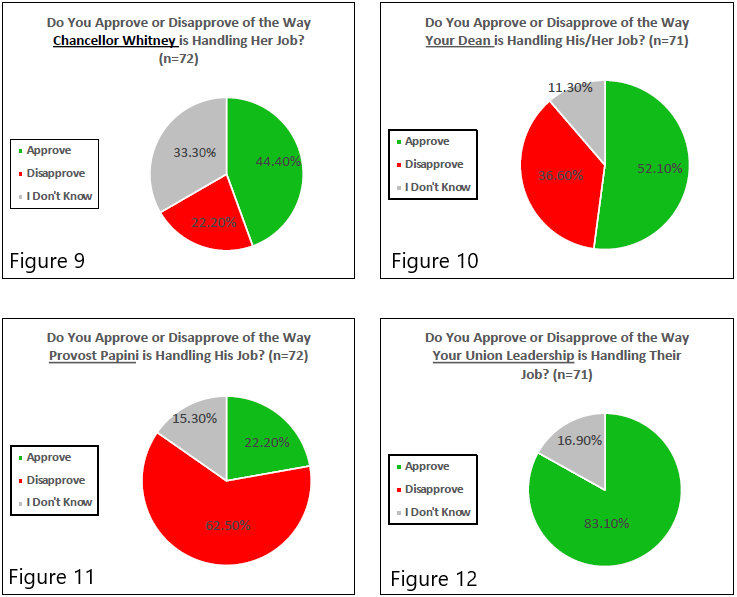
In the preceding results, we see a continuation of the trend depicted in the first and second areas. In Figure 9, we can see that 44.4% of respondents approve of the way Interim Chancellor Whitney is handling her job. In Figure 10, we can see that 52.1%, slightly over the majority, of respondents approve of the way their dean is handling their job. In Figure 11, we see that only 22.2% of respondents approve of the way Provost Dennis Papini is handling his job, a troubling number for Papini. And, finally, in Figure 12, we see that a large majority, 83.1%, approve of the way UIS UF leadership is handling their job.
The trends illustrated in Areas 1 and 2 depict a concerning view of faculty retention and happiness, one analogous to a loud blaring alarm bell that cannot be ignored. However, Area 3 shows us some very interesting insights into why. A great deal of UIS UF members disapprove of the way both Interim Chancellor Whitney and Provost Papini are handling their jobs – two of the top UIS administrators. This speaks to the possibility of a toxic work environment, one that can only lead to further issues with faculty retention as nobody enjoys working somewhere they are not appreciated, are not respected and hold little respect for the direction their superiors are leading the organization. On an interesting note, it appears at least a bare majority of UIS UF members approve of the job their dean is doing.
Area 4: Comparing Performance of Deans Across UIS Colleges

In Area 3, we see an interesting divergence from the otherwise evident trends. Area 3 depicts a bare majority of UIS UF members approve of the job their dean is doing. We examine this in more detail in Area 4, and the findings are captivating. We find that in CLAS (College of Liberal Arts and Sciences) we see a very large majority, 32 of the 37 respondents or 86%, approve of the job their dean is doing. Meanwhile, in the other three colleges CBM (College of Business and Management), CPAA (College of Public Affairs and Administration), and EHS (College of Education and Human Services) we see bleak results, 8 of the 31 respondents (26%) approve of the job their dean is doing.
It seems that even from one college to the next, the experience of faculty greatly differs and that solely faculty in CLAS seem to approve of the job their dean is doing. This is questionable for the deans of CBM, CPAA, and EHS who seem to have the same level of approval for their jobs as does Interim Chancellor Whitney and Provost Papini. Taken together, these results in totality paint a potentially harmful picture for the future of the quality of education here at UIS. The results should be of paramount concern to every student here at UIS, as we all want to obtain a quality education that will allow us to take the next steps in our professional careers.
The UIS UF Faculty Member Perspective
We also spoke to some faculty members – who are, simultaneously, members of UIS UF – as a way to hear directly from them about their main concerns and thoughts about being part of the union. Dr. Richard Gilman-Opalsky of the UIS Political Science department stressed a union’s necessity under circumstances like this. “Current UIS Faculty Union contract negotiations prove why faculty on our campus need a union,” he said. “The administration’s insistence that they are doing everything they can is not credible. There are so many easy and basic things they can do that they will not agree to.”
Dr. Gilman-Opalsky went on to reflect and compare the turbulent events that occurred during the last contract negotiations to the current ones. “In May of 2017, UIS faculty had to go on strike to get a contract done. At that time, like now, the administration said they were working as hard and fast as they could, but in fact, they dragged their heels until we stopped working. Only then did things speed up. This time, we see the same thing, but today, the administration is showing what their active commitment really looks like with regard to the reorganization effort… We can see right in front of us what it really looks like when they want to get something done! I wish they would bring the same energy and commitment to contract negotiations that they bring to other initiatives. Initiatives like reorganization, by the way, depend upon faculty labor. Sometimes, this administration treats the faculty as if we are in their way! Sometimes, it is as if they forgot what a university is for, what students come to a university for.”
Highlighting the heightened volume of stress due to an absent contract, Professor Deborah Anthony of the UIS Legal Studies department said, “Because of our lack of a contract, UIS faculty are working under worse conditions than faculty at the other campuses in a number of critical areas, including parental leave, salary and raises for faculty who have been promoted. This creates unnecessary stress and uncertainty for professors, and it contributes to a sense of being devalued by the institution.” Professor Anthony continued, “What’s more, the faculty working on negotiations are volunteering their time on top of their regular fulltime workload. The time commitment is intense and prolonged. If the administration doesn’t work efficiently or productively in the bargaining process, it increases the work and time required of our faculty representatives, who continue to balance those efforts with excellent teaching, service obligations, and productive scholarship.”
Dr. Stephen Schnebly of The UIS Criminology and Criminal Justice Department emphasized the longevity of administrative inconsideration for faculty and students, beyond the current contract negotiations, stating: “Administrative failures have plagued UIS for years. These failures have caused enrollments to collapse, saddled UIS with crippling debt, crushed faculty morale, and even led some to question the future viability of our campus. These failures stem from an unwillingness/inability on the part of administrators to recognize that faculty and students are the lifeblood of a university – not unnecessary new buildings, administrative vanity projects, and external consultants that sell expensive ‘magic beans’ to failing administrations hoping for a quick boost in ‘productivity units,’ a sickening term administrators sometimes use to refer to students.”
Dr. Schnebly went on to say, “What is particularly alarming is that the U of I system has permitted these failures to continue. In doing so, President Killeen and others have communicated a clear lack of concern for the well-being of UIS students, faculty and the very institution itself. My concern is that this trend of [administrative] failure with zero accountability will continue to harm students and faculty and devalue our university. My faculty union colleagues and I are doing everything in our power to ensure that it will not. We are working diligently to negotiate a labor contract that respects the value of UIS faculty and students, and one that will ensure a bright and proud future for our university.”
Finally, Dr. Magic Wade of the UIS Political Science department, said: “My main priority for our contract is a fair and supportive parental leave policy that takes into account the obvious fact that the timing of a pregnancy or adoption cannot be perfectly aligned with the UIS academic calendar. Faculty members should be able to take a full, paid semester off from work following the arrival of a new child. Additionally, since a child is likely to arrive in the middle of a semester, substitute coverage for one’s teaching and service duties needs to be guaranteed for the duration of that semester, too.”
The Editorial Perspective
Here at The Journal, we are firm believers in transparency and bringing you, the students, the truth at all costs. We believe you have the right to know the detailed affairs of the university you are enrolled at, and pay for, to get your education. And we undeniably believe that we are all vastly more than just “productivity units,” despite the current thinking among UIS administration. We as students often consider the day-to-day operations of the university as a bureaucratic anathema that we must bear until we graduate. But the fact of the matter is, these operational processes, changes, and decisions affect everything about our educational experience here at UIS. We, as the editorial staff, think you should have all the facts about what is going on. We believe you should be informed so you can voice your opinion to the university about what you think about all the worrisome events relating to the UIS UF contract negotiations.
Alongside students, UIS faculty members are the core of this campus. Without their expertise and vision for a brighter future, UIS would be merely a hub of social gathering and connection. While this plays a significant role in the UIS community, it is safe to assume that this is not the sole purpose of its existence. Nor is this the only aspect students and faculty seek in a well-rounded college experience. To undermine the significant worth and capabilities of faculty members is an utterly humbling realization to those who matter most. It is through the work ethic of such faculty that a lot of students grow from a pupil’s understanding to something greater. To subvert the impact of this role to something lesser, deemed underserving, is to simultaneously understate the collegiate experience of UIS students.
As students ourselves, we want the best possible experience for the cost of the higher education we are paying for. We all know, higher education isn’t cheap and the loans we take out take years upon years to pay off. The cost of higher education is more than it has ever been in this country, and we should be getting the value of that cost increase. Instead, the university seems to value the bottom line more than they do a quality educational experience with seasoned faulty, who are experts in their fields and want to stay at the institution for years to come, to continue to shape the young minds of the future. What does it say about a university that has a high retention rate, low happiness among their faculty members and an administration which seems not to care about anything beyond the bottom line? Is this truly the education experience we want? Is this the way we move forward with a positive career outlook after our education?
These are the questions we leave you with because we can’t answer them for you. What we can tell you for certain is: we believe the faculty deserves what they are demanding. We believe no one should work a job that doesn’t pay a living wage, which we can’t even believe continues to be a conversation going on in academia. We believe that faculty members deserve, at the bare minimum, the appropriate types of sick and family leave they deserve. No one in this country should have to choose between their job and a new family or dealing with an illness. Furthermore, we believe both the students and the faculty deserve a safe campus to both learn and teach at. While there are many other demands of the UIS UF that we also agree with, these are the points that resonate with us innately. The time for inaction has passed, the time for railroading is over, and the time for the UIS administration to do the right thing and provide a contract with the requests from the UIS UF is 50 days past due.
In an analogy that everyone on this campus should understand, if you turned in an assignment 50 days past its due date, what kind of grade do you think you would get? We think you all know the answer to that question – and we know the administration knows the answer too: you would receive a failing grade. The same grade the UIS administration receives in its clearly unconcerned, uncaring and unrelenting continuation of this impasse that is all of their own creation. The callousness and unwillingness of the administration to see the bigger picture of how this effects the educational experience and outlook for the students should be the greatest point of concern for you, the students. If they don’t care about the quality of our education, what does that say about the worthiness of the degree we all will receive when we graduate? Considering these degrees are the foundation of getting into professional careers, this question should haunt you.
We leave you with the words of Maya Angelou: “When someone shows you who they are, believe them the first time”. Well, the administration has made it clear who they are. When are we going to start believing them?


